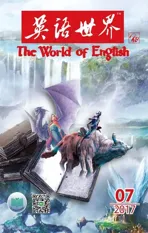参照 变通 融合
——首届世界中医翻译大赛点评
2017-02-07林巍
文/林巍
此次为世界范围内的首届中医翻译比赛,得到各大专院校师生及广大中医翻译爱好者的积极响应,共收到454份有效参赛译文(数十份无效译文)。经过暨南大学翻译学院严格的匿名初评,筛选出30份入围作品,交到北京参加复评和终评。由各方中医翻译专家组成的终评委员会,经过认真细致地分析、审核、评估,最后评出二、三等奖(一等奖空缺)和优秀奖。值得指出的是,有三位获奖者未缴纳参赛费或未提供联络方式,因而根据大赛规则被取消资格,实属遗憾。
大赛结果已由世界中医药学会网站公布。
大赛原文为笔者所写的中医普及性文章,看似平浅,但蕴含了中医学的基本属性和特征,既需语言翻译能力,又需一定专业知识。针对参赛译文中的主要问题,现从以下三个方面加以分析点评。
一、多维度的参照
段[1]中,“不是一般意义上的医学”,参赛者一般译成“… is not considered in a general sense” “is not a common medicine” “is not just common medicine, as is often referred to, but a kind of culture”等,固然可以接受,但推敲起来,不够准确。纵观历史,西方也有传统医学,主要是由古希腊希波克拉底(Hippocrates)奠定的古典西方医学,但从16世纪人体解剖学的建立,到17世纪物理学、化学知识对医学的渗透,医学家通过实际观察和实验来研究人体的疾病问题,从而逐步形成了科学医学体系,一般译为scienti fic medicine,以有别于其他医学体系,如之后的“循证医学”(evidence-based medicine)等。
段[5]中,“中医医生”多被译成了Chinese doctor,其实有误。在西方,西医被称为orthodox medicine(正统医学),这与其说是医学的分类,不如说是一种社会文化的认知(即为社会大众所认可),而中医属于alternative medicine (complementary medicine, fringe medicine),即另类医学,或补救医学、替代医学等。西方权威的医学词典Oxford Concise Medical Dictionary对此解释如下:the various systems of healing, including homeopathy, herbal remedies,hypnosis, and faith healing, that are not regarded as part of orthodox treatment by the medical profession, especially when offered by unregistered practitioners.…The extent to which individual registered practitioners indulge in or spurn these therapies varies enormously but is governed by the overriding principle that shared care is only permitted if the registered practitioner remains in overall control; this is often unacceptable to those practicing alternative medicine. (Martin A. Elizabeth, 2000: 49)(包括顺势疗法、草药、催眠法及信仰疗法等各种治疗体系,被医学界摒除在正统医学之外,特别是那些未注册的行医者。当正统疗法无效时,慢性病或不治之症患者便去尝试这些大部分未经证实的疗法。……即只有在注册医师主导下,才能进行与另类医学的配合治疗,而另类医学的治疗师对此又往往不能接受。)这段论述,不但界定了西医(正统医学)和中医(一种另类医学),而且可以看到对中医医生的称谓——practitioner或medical practitioner,而以笔者在国外的实践,在某种情况下还可称为doctor of Chinese medicine(下文亦有所涉及)。
同样在[5]中,对于“疾病”,参赛者使用了illness、sickness、ailment、malady、disease等,似乎都有道理,但应选择在此种语境中最恰当的“那一个”。分析起来,illness主要是指not feeling well,如“生病期间,她在家由私人教师辅导。”(She was tutored at home during her illness.);而sickness意为the state of being ill or unhealthy,与illness类似;ailment则为“小病”(not serious illness),如“The pharmacist can assist you with the treatment of common ailments.”(药剂师只能帮助你治疗日常小病。);相比之下,malady则为any unwholesome or desperate condition,即更严重的疾病,但现在更常用在社会方面,指a serious problem in society(社会顽疾)等。就(中医医生眼里的)“疾病”而言,不同于上述这些,而是一种general disorder,即disease,专业医学词典释为:a disorder with a speci fic cause and recognizable signs and symptoms; any bodily abnormality or failure to function properly, except that resulting directly from physical injury (the latter, however,may open the way for disease).(Martin, 2000:459)(有某种特定病因并有可识别的体征和症状的病症,包括任何躯体畸形或不能正常发挥的功能,但不包括物理性损伤〈尽管后者可导致疾病〉。)故disease最为恰当(同样适用于[2] [4])。但在[7]中,“……(产生)病症(的心理与情绪)”,则又不妨译为malady。
段[2]中的“(这主要是由中医的)形成和理念所决定”,参赛者一般译成了“… which is mainly determined by its formation and concepts”“…which is mainly decided by the development and idea of TCM”“It is attributed to the formation of traditional Chinese medicine as well as its concepts”等。其实,这里的“形成”是一个历史过程,有的用了“… how TCM came into being”,比较得要义,或可用“… based on its traditions(and ideas)”,尽管在字面上好像相距远一些,但比较起来,在内涵上则是最接近的。
实际上,该文处处从一种比较的角度来阐述问题:说中医不是一般意义上的医学([1]),主要是相对西医而言的;把人看成是解剖器官的是西医,而中医则更看重人的因素([2]);而试图以现代学科的分类来界定中医学,也是很难的,会得出不同的结论([4]),这也是以西医为标准的;中医对于“病”的理念,西医也是不认同的([5][6][7]),等等。故相应的翻译也应有对比意识,如用“while… but…”“from the point of view, … however, …”“…regard … , in a way …”等一些对比式介词、句式。其中,由比较得鉴别,非类比但有对比,以表示两种不同性质的医学,如[5]中的“病变”,中医里并无恰当的对应词,故不妨用西医中的学科术语pathology。同时,在语言、语境层面,还要作出许多变通与融合。
二、合理性的变通
参赛译文中的许多译法显得比较生硬、僵化或有“字典痕迹”。这既有语言也有理解上的问题,故需在翻译中加以磨合和变通。
就标题“中医:一门人的系统医学”而言,参赛者大都将其中的“人的系统医学”译成了A Systematic Medicine Concerning Human body、A Systemic Medicine for Humans、A Systems Medicine of Human、A Systemic Medicine for Humans、A Human-oriented Medical Science、A Systems Medicine of Human、A Systematic Medical Science about Human、A Systematic Medical Science about Human等,显然是将“人的系统医学”看成了“人的”“系统医学”,实则应理解为“人的系统”“医学”,即是将人看成一个系统(即中医的核心理念),而且应当加上“医治”之意,同时词语上应避免重复medicine。有的参赛者具有这种意识,如译成An All-round Therapy for Human、A Systemic Medicine of Treating Human Diseases、A Theraputic Approach for People等,但不妨进一步明确:“Traditional Chinese Medicine: Treating the Human System”。这种变通虽然在语言层面上看似不对等,但却在实际内涵中更加相符。
在原文中有许多不同的“人”“病人”“人体”“人的因素”等,但其“人”却未必都是同样的英文对应词,需详加辨析,变通处理。例如,[2]中“把人看作是解剖器官”,其中的“人”大都被译成了man、people、human等,但分析起来,man与human都主要指与自然或其他物种的区别,如:①在老子看来,天人合一,人成于道。(According to Lao Zi, man and nature are united as one in essence, and man cultivates himself as cultivating the nature in the Dao.) ② Some animals possess the characteristic of man.(有些动物具有人的特征。)③毕竟我们都是人。(After all, we are human.)当然,man有时也泛指“正常人”,如:No man in his senses would have done so.(没有一个神志清醒的人会这样做。)但是,这些却不是此处“人”的性质;此处是解剖学意义上的“人”,故可用human body,更具客观性。
至于“人(处次要地位)”,参赛译文也以human/humans居多。其实,这里强调的是医生眼里活生生的人,即“a human being, considered as someone with their own particular character”,故应为person,既是客观的,也是主观的“人”,如:人的情绪对于人的疾病和健康有着非常微妙而深刻的影响。(A person’s mood has some subtle and profound effects on his or her health and conditions.)而下面的“人(在治疗过程占主导地位)”,虽性质依然,由于是对中医的治疗理念而言的,故不妨将其扩展为the person as a whole,以使这一概念更加完整;同样,[5]中的“治病的根本在治人”中的“人”,也可比照处理。
“人(的因素决定一切)”,有的译成man’s factors、person as a factor等,实质可为human factors、personal factors,但在医疗语境下,更常用的是human conditions,如:①他身体健康。(He is in good condition.)②The doctors describe his condition as serious and say he is very lucky still to be alive.(医生说他病情严重,能活着已经很幸运了。)
段[8]中,“人体状况”更突出了这种性质,不过为强调其具体性,不妨译为individual human conditions。但是,[7]中的“人(的所有因素)”,涉及到的又不只是医学问题,还有人的心理、情绪等,故不妨又以human factors为宜。与此相关的,[2]中的“将疾病与患者的生命相分离”,其中的“生命”一般都译成了patient’s life,固然不错,但在医学语境里,这里不是一般的生命状态,而是一种病人的身心状况,如“医务人员要对病人的生命负责。”(Medical staff are responsible for the well-being of their patients.),故以well-being更宜。
然而,[4]中的“既是人为的,又是自然的”,参赛者又多将其译成这样一种关系,如man-made and natural、man-made factors and nature、arti ficial or natural、 human and nature等;其实,这里更多强调的是主观与客观,故不妨用 objective and subjective等。与此相关的,[3]中的“人与自然服从同一法则”,许多参赛者翻译成obey、rely、abide by、obey to、submit to、comply with等,但这些词都有be obedient to authority之意,用于“人”是可以的,但用于“自然”显然不合适。《老子》中有句名言,“人法地,地法天,天法道,道法自然”,可译为:Man follows the ways of Earth;Earth follows the ways of Heaven; Heaven follows the ways ofDao;Daofollows its own ways. 此中的follow用得很自然,其义为“do the same as …”,故此处不妨译为both humans and nature are bound to follow theDao(the rule of the universe),其中括号内进一步说明Dao的性质。
段[5]中,“病人整体机制出现了某种失衡”,其中的“机制”多被译成了mechanism,但此处应考虑在医学界、生物界更适用的词语,即organism,其意为a living thing that has (or can develop) the ability to act or function independently,该处不妨译为a loss of balance in an organism。
一些看似简单的词语,若不加认真考量,也会有偏差。如[7]中“……但却看不到产生病症的心理与情绪”,其中的“心理”译成psychological factors、psychic 等,“情绪”成了mood、sentiment等,似乎都欠准确,不如the mentalities and emotions更恰当。[8]中的“单纯的医学”译成pure medical science,固然不能算错,但有更多的研究学术味道,pure medicine更符合大众眼中的一种疗法;而[2]中的“(病症永远不会是)局部的”多被译成了localized、localization等,而local的本义为“existing in or belonging to the area where you live, or to the area that you are talking about”,显然用此概念过大。
类似的,[4]中的“以现代学科的分类来界定中医学”,一般译成“…to define the Chinese medicine by the classification of modern science”“…define TCM in accordance with modern classifications of disciplines”“… to de fine TCM in line with classi fication of modern disciplines”等,固然都是不错的;然而,就性质而论的,亦可用“… in modern scienti fic terms”,即以那种对待科学学科的理解来界定中医。
同时,在词序上也不必过分拘泥于原文,如[3]中“人既是自然的产物,又是自然的延伸和精华”,其中“延伸”和“精华”的逻辑重要性是中国式的思维,而在英文里顺序则是相反的,如“… as a natural product, is also the quintessence and an extension of nature”等。在[5]中,“……这在西医是不可以、也不愿意解释的,但却被越来越多的事实所证明”,参赛译文一般译成“… which is not acceptable and refused to be explained by western medicine, but has more and more been proved by the facts”等;其实,亦不妨以英文的思维变通词序,如“… —this phenomenon has increasingly been supported by the facts, but WM finds it hard to accept and explain”,从而捋顺其轻重缓急。
三、整体观的融合
纵观参赛者的译文,有些句子固然翻译出来了,但比较零碎,不够通畅——主要是指在思维上需要加以整合,从而写出更加地道的句式。
例如,[4]中的“人们试图以现代学科的分类来界定中医学,但发现很难”被普遍译成“People tried to clarify the modern science to de fine traditional Chinese medicine, but have found it is very dif ficult …”“People try to de fine the traditional Chinese medicine with the classification of modern disciplines.However, the process is dif ficult because”“An attempt to dignify TCM as the categorization of modern disciplines is hardly available, since it …”等,似乎在字面上很“忠实”,但这是中文的思维,需在根本上重新组织,不妨改译为“It is thus dif ficult to de fine TCM in modern scienti fic terms, ...”。接下来,“人是复杂的综合体……辩证地加以考虑”一句,出于中文“意合”的特点,此段文字中的一些概念和句式在翻译中需加厘清和梳理。具体而言,“复杂的综合体,介乎……之间”,比较典型的译文,如“a complicated combination—it situates somewhere among natural science, social science and philosophy—…”“Humans are complex in that they are natural, social and philosophical at the same time”等,其中“综合体”似都没有体现出来,应该是一种entity、synthesis、unity、body等,而“介乎……之间”的实质是“其中有/综合了……这些成分”,显然不是among、between、in the mist of 之类的,而是synchronize、combine、coordinate等。“局部的”“整体的”似乎又不完全对应part and whole、local and general等。“需要多方、综合、辩证地加以考虑”,指的是中医的“构成中医的核心内涵”,应体现在kernel、essence、core values等核心词上。
[3]中的“因而人与自然服从同一法则——道”,一般译成了“Thus,men and nature observe the same principle—Dao”“so people and nature obey the same law—Tao”“Therefore, both humanity and the nature abide by the same set of rules known as Tao”等,固然都有可取之处,但鉴于通篇所讲的自然与人体的客观规律,这里不妨加以引申“to follow theDao(the rule of the universe)”, 也是一种通融。特别是“人道依存于天道,天道服务于人道”,一般容易译得繁杂冗赘,如“the law of humans depends on that of heaven while the latter serves the former”“Human’s principle relies on the nature’s and the latter one serves the former one”“Human Tao depends on Heaven Tao,while Heaven Tao serves Human Tao”等;其实可不必转换主语,而“一以贯之”:the heavenlyDaobegets as well as serves the humanDao…
回到上文所述[1]中的关于“……不是一般意义上的医学”,将其译成“(As a culture, traditional Chinese medicine is), in fact, not a medicine in its general sense”“… not a common medicine …”“… not a commonly regarded medicine”等,再自然不过。然而,如果通观全文,便会发现,本文所论述的是中医不仅仅是一种医学,而且涉及到哲学、文化、人学等,故整句不妨译为: As a culture, Traditional Chinese Medicine (TCM) is normally considered far more than medicine for people.所以,原文的第一段,往往宜放到最后翻译,以收统览全局之效。
此外,一些细节上的问题,如漏译题目、格式混乱、不分段落、标点错误、字体怪异等,亦应引起注意,这些其实也是专业水平的一部分。
总之,就首届世界中医大赛而言,参赛者的热情和总体水平都值得肯定;以上问题亦可出现在其他专业的翻译之中——翻译质量的提高永无止境。我们有足够的信心,期待在接续下来的历届大赛中,涌现出更多高水准的译文。 □
猜你喜欢
杂志排行
英语世界的其它文章
- Brief Intro of Fantasy奇 幻 文 学 简 介
- Sources of Fantasy奇幻之源
- George R. R. Martin: A Lifetime of Fantasy乔治·R.R.马丁的奇幻人生
- Literary Mysteries: Did Tolkien Really Create Entire Languages for His Books?文学之谜:所有语言都是托尔金造的?
- Fantasy: The Blueprint of the World奇幻文学:世界的蓝图
- The Doctor, His Wife and the Clock (Excerpt II)医生、妻子与时钟(节选二)
